The Eisenhower Presidency
The Eisenhower Presidency
Lessons for the Twenty-First Century
Edited by
Andrew J. Polsky
LEXINGTON BOOKS
Lanham Boulder New York London
A Roosevelt House Book
Published by Lexington Books
An imprint of The Rowman & Littlefield Publishing Group, Inc.
4501 Forbes Boulevard, Suite 200, Lanham, Maryland 20706
www.rowman.com
Unit A, Whitacre Mews, 26-34 Stannary Street, London SE11 4AB
Copyright 2015 by Lexington Books
All rights reserved . No part of this book may be reproduced in any form or by any electronic or mechanical means, including information storage and retrieval systems, without written permission from the publisher, except by a reviewer who may quote passages in a review.
British Library Cataloguing in Publication Information Available
Library of Congress Control Number: 2015952396
ISBN: 978-1-4985-2220-5 (cloth : alk. paper)
eISBN: 978-1-4985-2221-2
 The paper used in this publication meets the minimum requirements of American National Standard for Information SciencesPermanence of Paper for Printed Library Materials, ANSI/NISO Z39.48-1992.
The paper used in this publication meets the minimum requirements of American National Standard for Information SciencesPermanence of Paper for Printed Library Materials, ANSI/NISO Z39.48-1992.
Printed in the United States of America
To Jennifer Raab, President of Hunter College, whose vision and energy brought Roosevelt House back to life and revived it as a treasure for the college and the city it serves.
Contents
Jonathan Fanton
Daniel A. Sharp
Andrew J. Polsky
Kenneth E. Collier
Geoffrey Kabaservice
David A. Nichols
M. Stephen Weatherford
Mark Shanahan
Zuoyue Wang
Meena Bose
Douglas Little
Dale R. Herspring
Adam M. McMahon and Andrew J. Polsky
Andrew J. Polsky
Jonathan Fanton
Interim Director, Roosevelt House Public Policy Institute at Hunter College, 20102014 President, American Academy of Arts & Sciences
On March 78, 2013, a group of scholars convened at the Roosevelt House Public Policy Institute at Hunter College for a conference to discuss the Lessons from the Eisenhower Legacy for the 21 st Century. Only three years earlier the house, which had been occupied by Franklin and Eleanor Roosevelt and by Franklins mother Sara, had been reopened, following a complete renovation driven by the vision and energy of Hunters president, Jennifer Raab. It now serves as the headquarters for two undergraduate programs (in public policy and human rights, respectively) and hosts a robust public program of lectures, conferences, and discussions of important domestic and international issues meant to bring scholars and policy makers together with the general public. Soon after the doors opened again, Roosevelt House and the Dwight Eisenhower Foundation began to plan a conference on the theme of the enduring relevance of the Eisenhower presidency, both positive and negative, in our own era. The formal conference program was very ably guided by Professor Andrew J. Polsky, a political scientist at Hunter College. Most of the papers written for the conference appear in the pages that follow.
While our conference focused on Dwight Eisenhower, it seems appropriate given the setting to reflect on the relationship between Eisenhower and Franklin Roosevelt. Ike, after all, achieved military fame under Roosevelt, opening a path to the White House that would have otherwise been inconceivable. Interestingly, Eisenhower did not place Roosevelt among the group of presidents he most admired. And Ike was a Republican who came into office when many members of his party looked to him to roll back major parts of the New Deal and shrink the size of government. Yet, we can identify certain parallels between the two presidents.
Consider, for example, some words spoken by one of them at a rally in the public square in Cleveland:
[W]hat has your Government been doing? In virtually every area of human concern, it is moving forward. Government has had a heart as well as a head. Now, my friends, in telling you about some of the things this Administration has been doing, I hope you will not take it that I am boasting. There will never be room for boasting in this regard until there is not a single needy person left in the United States, when distress and disease have been eliminated. I am talking about progresshow far we have gone ahead.... Social Security has been extended to an additional 10 million Americansunemployment compensation to an additional 4 million Americans. Our health program has been greatly improved.... Research into the causes of crippling and killing diseases has been markedly stepped up. The minimum wage has been increased, even though my recommendation for its wider coverage was not acted on in the Congress.... Sympathetic understanding has been fostered and intelligent progress has been made in civil rights. Segregation has been ended in restaurants, theatres, hotels, and schools in the District of Columbiaended in Government departments, the Armed Forces, veterans hospitals.
Although this sounds at first blush like the liberal Roosevelt, by the end we recognize Eisenhower. His embrace of core New Deal programs gave them bipartisan legitimacy, a new foundation for governments responsibility for human security and opportunity.
Yet, there was no special warmth between the two men, perhaps the result of something that happened early in World War II. Eisenhower had risen very quickly to high rank, due to his own gifts as a military planner and the sponsorship of General George C. Marshall. Ike was placed in command of the first major Allied amphibious operation of the war, the invasion of North Africa, then under Vichy French control. The landings had gone about as well as could be hoped, and he also had shown skill in his dealings with the various French factions. But his initial performance as a commander of troops in the field had been lackluster. He had failed to prevent German reinforcements to Tunisia and American troops suffered a humiliating defeat in early 1943 at Kasserine Pass. There were real doubts in Washington and London about whether Eisenhower had the right stuff to run major military operations.
Roosevelt let Eisenhower dangle for a while, refusing to promote him or confirm that he would command the upcoming invasion of Sicily. The president wanted to see more. Although his caution was rational, Eisenhower could not have been happy about it. In the end, of course, Allied forces prevailed in North Africa, and the performance of American troops in combat improved quickly. But a coolness between the president and his general may have lingered.
Ike also was not happy about some of the political decisions Roosevelt made. Roosevelt decided to demand the unconditional surrender of Germany and Japan. Although Eisenhower understood that the Nazi regime had to be eradicated root-and-branch, he also believed that the announcement of the policy would make German troops fight harder and cost more American lives.
On the other hand, Eisenhower witnessed in Roosevelt a political master at work. We can reasonably conclude that some of the lessons influenced Eisenhowers leadership style. Consider Ikes own unpleasant experience in North Africa. Roosevelt showed that a president must set high performance expectations for his key subordinatesthe fate of his administration, and possibly the nation, depend on it. Being president requires a measure of ruthlessness. FDR had it, and Eisenhower experienced it.
FDR also recognized the importance of freedom of action. As Andrew Polsky points out in his recent book, Elusive Victories: The American Presidency at War , this was the cornerstone of Roosevelts wartime leadership. He made a point of holding meetings with his military chiefs at which no notes were takena clever way to allow him to backtrack when necessary or leave no fingerprints on controversial decisions. He had an elaborate vision for the postwar world, but he never laid it out in a speech and always left room to adjust to new international conditions along the way. He carefully juggled domestic constituencies ranging from conservative Southern Democrats to organized labor to big business.
Next page
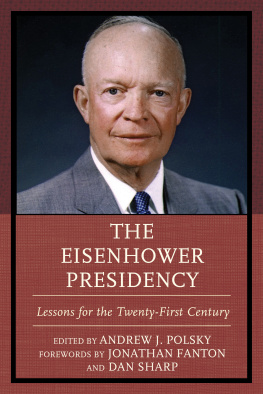
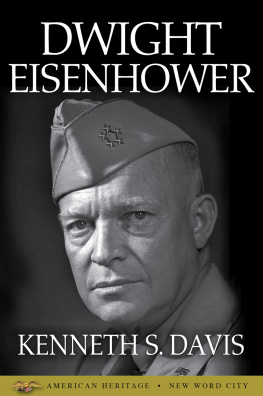

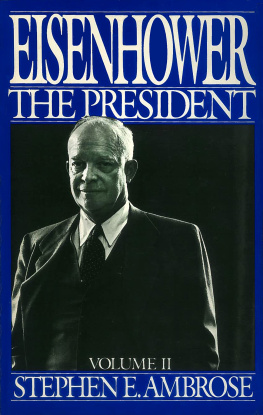
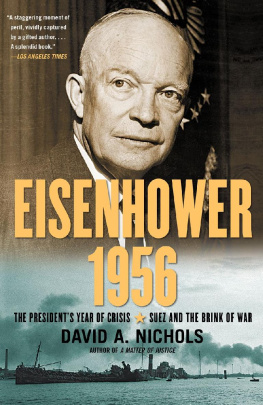
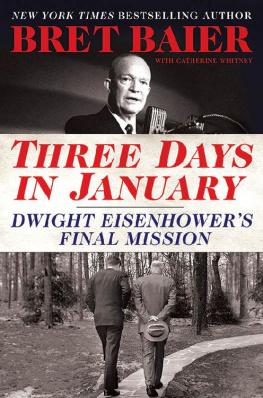
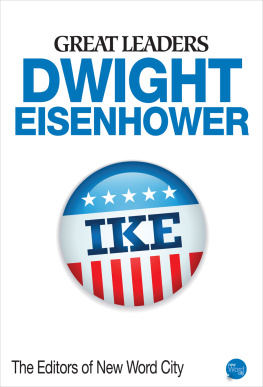
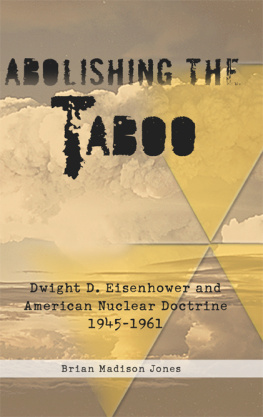
 The paper used in this publication meets the minimum requirements of American National Standard for Information SciencesPermanence of Paper for Printed Library Materials, ANSI/NISO Z39.48-1992.
The paper used in this publication meets the minimum requirements of American National Standard for Information SciencesPermanence of Paper for Printed Library Materials, ANSI/NISO Z39.48-1992.